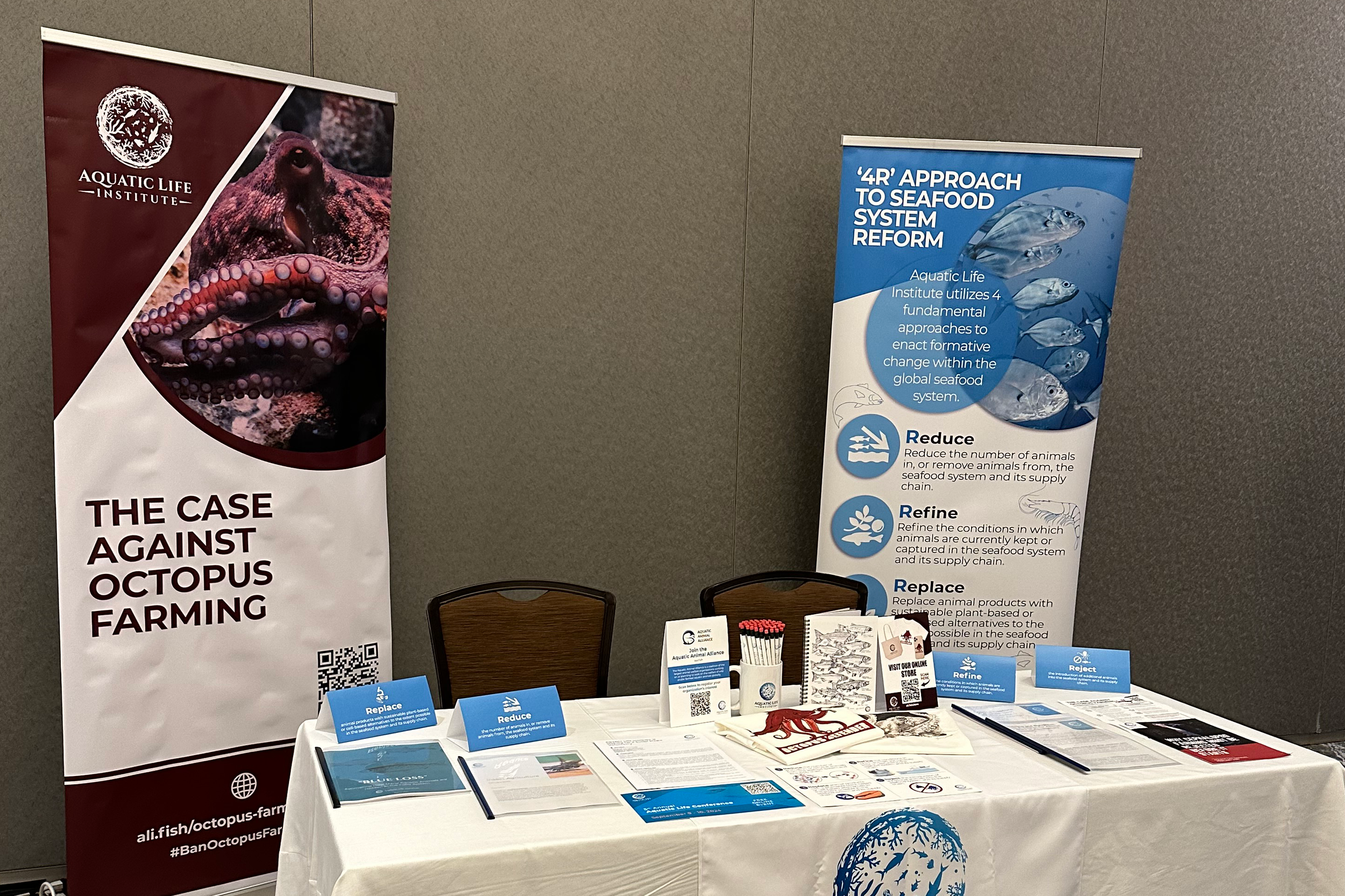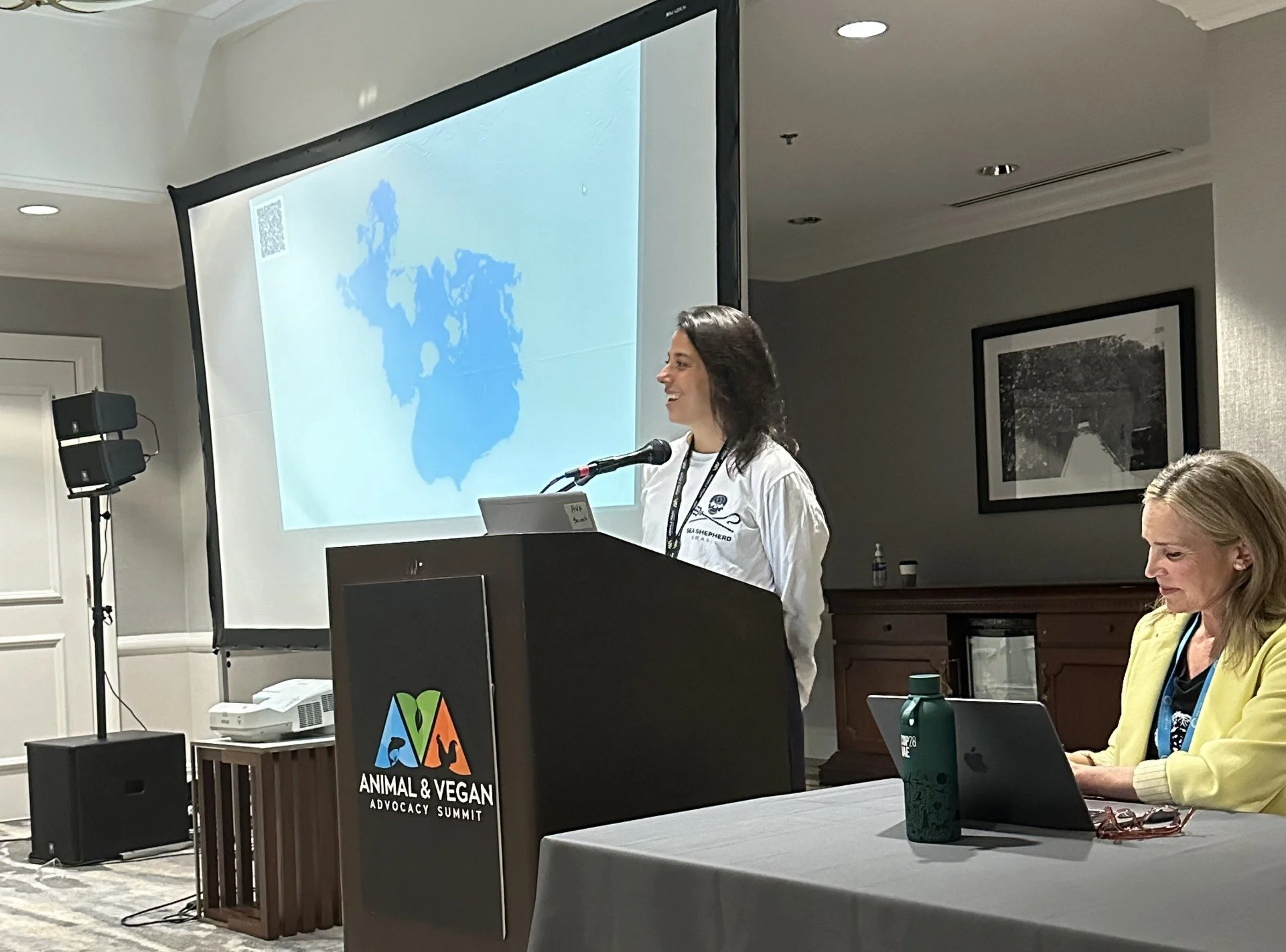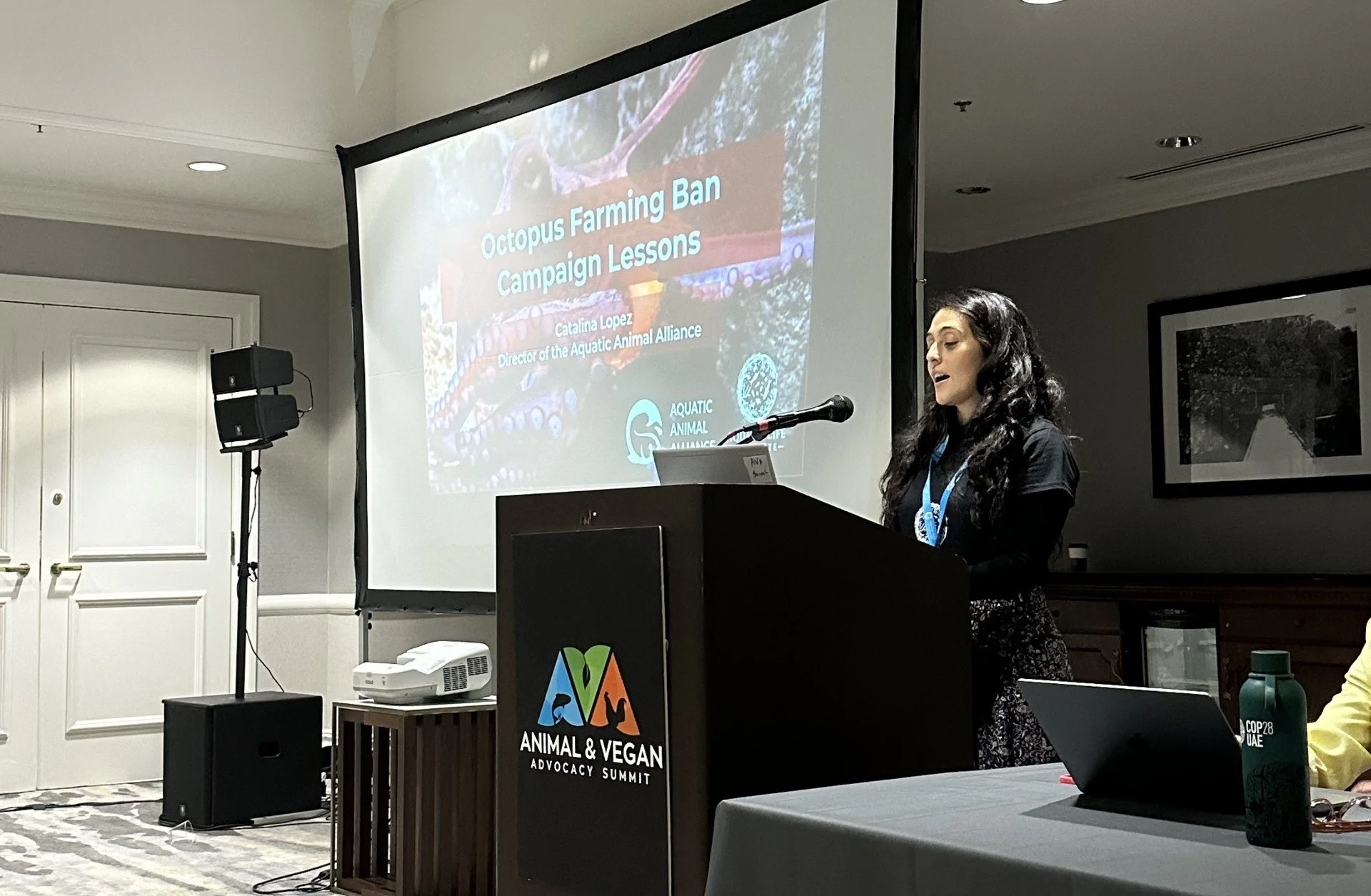Aquatic Animals at the Animal and Vegan Advocacy (AVA) Summit 2024
From May 16-19, Aquatic Life Institute (ALI) attended the Animal and Vegan Advocacy (AVA) Summit in Washington, DC, where more than 800 animal advocates convened, and over 70 sessions took place to strengthen our advocacy efforts for animals in the global food system. Five of our team members attended the event, where we had the opportunity to showcase our work, connect with like-minded individuals, and contribute to the growing movement for aquatic animal welfare.
ALI at the Forefront
Our presence at the AVA Summit was anchored by our booth, where we highlighted our Octopus Farming Ban Campaign and our work around the ‘4R’ Approach to Seafood System Reform: Reduce, Refine, Replace, Reject. Each day, several AVA attendees visited our booth and expressed their gratitude for our team’s commitment to advancing aquatic animal protection, which truly fuels our dedication to our mission.
Aquatic Animal Meet-Up
One of the standout moments for ALI was hosting a meet-up for those interested in aquatic animal protection. We organized breakout groups for each of the 4Rs, fostering rich discussions with participants from diverse backgrounds. This interactive session allowed us to exchange ideas and strategies on how to effectively protect aquatic animals through these fundamental principles.
The meet-up was a highly attended event, reflecting the growing interest in aquatic animal welfare. We are thrilled to see more organizations and individuals eager to learn and implement impactful interventions for aquatic animals in their regions and in their work.
Aquatic Animal Advocacy Panel
Our team also led the "Aquatic Animal Advocacy" session, bringing together experts to share their knowledge and inspire further action in the field. Moderated by ALI’s Managing Director, Sophika Kostyniuk, the panel featured Catalina Lopez, Director of the Aquatic Animal Alliance, alongside panelists Nathalie Gil from Sea Shepherd Brasil, Dr. Kikiope Oluwarore from One Health and Development Initiative, and Jennifer-Justine Kirsch from Fish Welfare Initiative. Throughout the session, the panelists explored a range of topics, including the ethical and environmental considerations of overfishing and aquaculture, and the importance of integrating high welfare standards into global seafood production.
Catalina discussed the ethical, environmental, and scientific reasons behind ALI’s Octopus Farming Ban Campaign, and offered lessons learned that can support other advocates in their efforts to protect aquatic animals. Nathalie provided an overview of her organization's efforts to combat illegal fishing and promote marine conservation. Dr. Kikiope Oluwarore, one of ALI’s board members, spoke about her work in Nigeria with fish farmers and illustrated the intersection of animal welfare, human health, and environmental sustainability. Jennifer-Justine Kirsch discussed practical approaches to improving fish welfare in aquaculture. She shared her organization's innovative strategies for engaging with the industry and promoting higher welfare standards.
Audience members were actively engaged, asking thoughtful questions and sharing their perspectives on the challenges and opportunities in aquatic animal advocacy. The session underscored the necessity of a coordinated and multifaceted approach to protect these often neglected species and fostered a sense of community among advocates dedicated to this cause.
Other Highlights
Strategic Discussions: Engaging in strategic discussions on shrimp intervention tactics and philosophical approaches provided us with new insights to enhance our advocacy efforts for shrimps.
Leadership: ALI’s Managing Director, Sophika, was a part of the AVA Steering Committee, ensuring the overall success of the event.
Morning Meditation: Starting our days with meditation sessions helped us stay grounded and resilient.
Team Bonding: Connecting with our team in person deepened our understanding of each other, strengthening our interpersonal connections.
Community Building: Socializing after hours allowed us to enjoy the community in an unstructured way, key to building unity within the movement.
Intersectionality in Animal Advocacy: Apex Advocacy led a session on fostering BIPOC allyship, emphasizing the intersectionality of animal protection with other social justice movements.
Key Takeaways
The animal welfare movement is becoming more strategic and professionalized, with sessions highlighting new, collaborative tactics focused on effective advocacy and measurable impact. There is a growing awareness and concern for aquatic species, signaling a significant increase in advocacy efforts along the entire seafood supply chain. The supportive environment at the summit enhanced our collective efforts and morale, demonstrating the strength of a united advocacy community, and insights from the diverse community of global advocates provided us with specific strategies and success stories from different parts of the world. It is also always truly rewarding when our remote, international team has the opportunity to meet up in person to connect and collaborate.
Looking Ahead: Strengthening Connections and Campaigns
Looking ahead, the AVA Summit not only provided us with the opportunity to forge valuable connections with leaders in the animal welfare space but also allowed us to set up various individual meetings to collaborate on future projects for aquatic animals. Our Octopus Farming Ban Campaign received significant attention with the recent success of Washington State passing a law to prohibit octopus farming, and other states recently introducing similar bills.
The event was a fulfilling experience with lively energy and emotional inspiration. Advocates from around the globe convened to share their work, foster connections, and strengthen our movement. Through teaching, learning, and spirited debate, we are collectively working towards a better future for our planet.
As one of the few organizations fully dedicated to aquatic animal protection, we are heartened by the growing concern for aquatic animals, and armed with newfound connections, innovative ideas, and the support of a global community of advocates.












